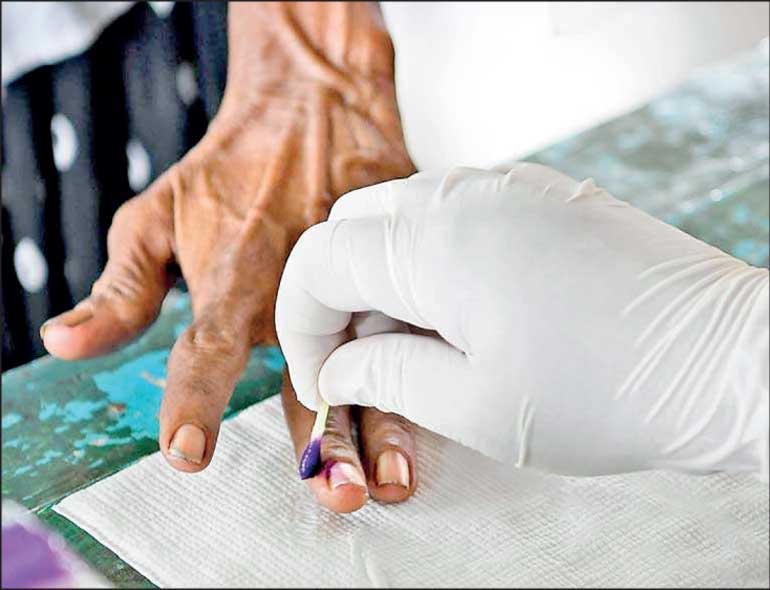Thursday Feb 26, 2026
Thursday Feb 26, 2026
Saturday, 23 November 2024 00:01 - - {{hitsCtrl.values.hits}}

The 2024 Parliamentary elections symbolise a pivotal moment of transition for Sri Lanka – Pic by Shehan Gunasekara
 I have always been deeply interested in Sri Lanka’s socio-political landscape and its complex history for three main reasons. First, as an ethnic Tamil minority who endured the brutalities of war during childhood, this subject holds personal significance. Second, my father, the late Sundaram Divakalala—a renowned Tamil civil servant—dedicated his life to public service, inspiring my interest in governance and justice. Finally, my professional experience at CMG Capital Maharaja Group, Sri Lanka’s largest private conglomerate and media powerhouse, under the leadership of its late Chairman, Late Kili Rajamahendran, further deepened my understanding of the nation’s challenges and potential.
I have always been deeply interested in Sri Lanka’s socio-political landscape and its complex history for three main reasons. First, as an ethnic Tamil minority who endured the brutalities of war during childhood, this subject holds personal significance. Second, my father, the late Sundaram Divakalala—a renowned Tamil civil servant—dedicated his life to public service, inspiring my interest in governance and justice. Finally, my professional experience at CMG Capital Maharaja Group, Sri Lanka’s largest private conglomerate and media powerhouse, under the leadership of its late Chairman, Late Kili Rajamahendran, further deepened my understanding of the nation’s challenges and potential.
For centuries, Sri Lanka and its people thrived, particularly in agriculture, irrigation, fisheries, and hospitality. However, following 443 years of colonisation, the country’s post-independence journey since 1948 has been marred by traumatic riots, a prolonged and devastating war, ineffective governments, a dysfunctional political system, corrupt politicians, and self-serving business interests. By 2022, Sri Lanka found itself burdened with massive debt, a crumbling system of governance, inept leadership, and a population grappling with widespread struggles.
Today, of the 23 million Sri Lankans, nearly 19 million belong to the working class, earning modest incomes. These citizens labour tirelessly to support their families and provide for their children, enduring immense daily hardships with resilience and determination.
Transformative chapter
The Parliamentary elections held on 14 November 2024, have ushered in a transformative chapter in Sri Lanka’s political history. With the National People’s Power (NPP) securing an unparalleled supermajority, the outcome represents a profound departure from the entrenched political order that has shaped the nation for decades.
The NPP’s triumph is the culmination of widespread public dissatisfaction stemming from years of economic mismanagement, rampant corruption, and the political upheaval that followed the ousting of former President Gotabaya Rajapaksa in 2022. President Anura Kumara Dissanayake, recently elected to the presidency, has adeptly harnessed this wave of frustration to solidify his party’s dominance. Remarkably, the NPP shattered traditional strongholds, including the Jaffna District, a bastion historically controlled by Tamil political parties.
Economic reform dominated the electoral discourse, reflecting the populace’s enduring struggle with the aftermath of Sri Lanka’s most severe financial crisis in recent memory. President Dissanayake has pledged sweeping anti-corruption initiatives and comprehensive political restructuring. However, critics caution that the concentration of power within a single political entity could inadvertently undermine the very principles of transparency and accountability that voters have demanded.
The electoral campaigns were not without controversy. Misinformation played a significant role, with fabricated narratives about NPP policies—such as exaggerated claims of punitive taxation and widespread asset seizures—circulating widely. This disinformation fuelled anxiety among certain demographics, particularly older voters, underscoring the pervasive influence of misinformation in shaping Sri Lanka’s electoral landscape.
Formidable challenges
While the NPP’s sweeping victory marks a decisive mandate for change, it also presents formidable challenges. The country’s fragile economic recovery hinges on successful debt restructuring and the restoration of international investor confidence. Sceptics question whether the NPP’s populist agenda can navigate the intricate dynamics of global economic relations without alienating critical international partners. Furthermore, the absence of a robust Opposition raises concerns about the erosion of democratic checks and balances, an essential safeguard in a nation emerging from political instability.
I believe, the 2024 Parliamentary elections symbolise a pivotal moment of transition for Sri Lanka. While the results reflect the electorate’s demand for systemic change, they also herald an era of uncertainty. The newly elected Government faces the Herculean task of addressing deep-seated economic and social grievances while safeguarding democratic ideals in an increasingly polarised environment. Whether the NPP can transform its ambitious promises into substantive progress remains to be seen as Sri Lanka navigates this critical juncture in its post-crisis trajectory.
It is crucial for all stakeholders in the nation to extend their support to the new President, Anura Kumara Dissanayake, and his Government to ensure a stable and prosperous future for Sri Lanka. A lack of collective backing could lead to serious consequences for the country.